|

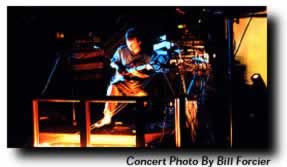 Generally
speaking when I've set out to do an interview in the past, I usually ask
the same 20 or so questions. The questions are almost always open-ended,
and can't be answered with a yes or no answer. I like for the artist to
write about themselves; I find that it catches the artist contemplating
their work and their art, in black and white in front of them, almost
as if they are thinking out loud rather than filling out some sort of
questionnaire that they've been sent for promotional purposes. Generally
speaking when I've set out to do an interview in the past, I usually ask
the same 20 or so questions. The questions are almost always open-ended,
and can't be answered with a yes or no answer. I like for the artist to
write about themselves; I find that it catches the artist contemplating
their work and their art, in black and white in front of them, almost
as if they are thinking out loud rather than filling out some sort of
questionnaire that they've been sent for promotional purposes.
I like this approach and I always have. I've enjoyed it in my own work
as well as others. Normally I edit and shape the interview into some cohesive
piece, comparable to the Rolling Stone interview, which asks a lot of
questions, and instead of transcribing, or writing out the questions and
answers of an interview, the questions and answers are sewed into the
fabric of a story. This is absolutely my favorite kind of interview.
There are other times, though, when the Q and A format that comes back
to me is far more elaborate and cohesive than anything I could put together.
It times like this, and the Jeff Pearce interview that I have no choice,
but to lay the groundwork and let this profoundly articulate artist speak
his piece. Profoundly articulate? I can imagine Jeff reading this right
now and laughing aloud thinking of the silly adjectives that I use to
describe him.
Jeff is a thoughtful and articulate artist, and his excellent body of
work demonstrates this. Jeff is also quite down-to-earth which makes talking
to him a good time, always!
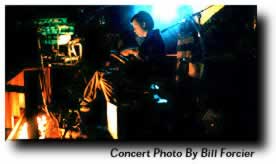 The
questionnaire, that I initially sent Jeff via email, has undergone some
light editing, very light, merely crossing the t's and dotting the I's.
Whenever I ask these questions, the same questions that I've asked time
and again, I get different revelatory and insightful answers, and that's
probably why I continue use the same old questions, sort of like minimalist
interviewing or something. Anyway, what follows is an interview that I
did with Jeff Pearce during the last few months of 2001. I hope you enjoy
reading this as much I did. The
questionnaire, that I initially sent Jeff via email, has undergone some
light editing, very light, merely crossing the t's and dotting the I's.
Whenever I ask these questions, the same questions that I've asked time
and again, I get different revelatory and insightful answers, and that's
probably why I continue use the same old questions, sort of like minimalist
interviewing or something. Anyway, what follows is an interview that I
did with Jeff Pearce during the last few months of 2001. I hope you enjoy
reading this as much I did.
MB: Who are you? Tell me about yourself.
JP: I'm just your average stay at home dad/ambient guitar player living
in the woods of Indiana. :) I've been playing music all my life, and started
on the guitar at age 13. My first CD, "Tenderness and Fatality",
was released in 1993, and lately my CDs have been released on the Hypnos
label.
MB: What inspires you to create?
JP: I think a combination of a lot of things. First of all, I've found
that, among "artists" of all types, there's almost this "need"
to create. I'm not going to use the word "drive", because there's
a lot of baggage that comes with that word. There are MANY people who
are incredibly creative who exist outside this little self-indulgent world
of "art". I know an electrician who is one of the most creative
people I've ever met; what he does in house wiring, etc.... I consider
to be an art. This man is a prime example of someone who's thought processes
exists "outside the box".
Regarding other inspirations, I'm always moved by nature. I love living
in the area of the country that I do- my family and I live on five very
secluded acres of forest in Indiana. I can't help but to be inspired by
the amount of nature around us, and the constantly changing seasons- that's
what I try to capture in my own music, the sense of things slowly moving
from one "season" to another. I can't imagine a more boring
place for me than a location where it's always hot or always cold. I enjoy
that "procession" that comes with the changing of the seasons.
MB: Who/ What are your artistic influences?
 JP:
For the music that I'm doing now, my first, and probably strongest, influence
was Debussy. I remembered the first time I heard his music. I was in high
school, and it was like discovering another world- the music just moved
around so much. Then, in my freshman year of college, I "discovered"
the music of Brian Eno through "Music for Airports". A week
later, I heard "The Pearl" by Budd and Eno. A week after that,
I picked up "Music for films" by Eno. To my ears, those recordings
have it all- the slow space drifts, the quiet, reflective, melodic pieces,
and the short, almost chamber-like vignettes. I still think those early
pieces of music still stand as some of the greatest recordings in this
genre- or any other genre, in my opinion! And I was introduced to the
wonderful music of Erik Satie by my good friend Tim Story. To this day.
Satie's music is so wonderful in its "smallness"; there's not
a wasted note in sight with his music! JP:
For the music that I'm doing now, my first, and probably strongest, influence
was Debussy. I remembered the first time I heard his music. I was in high
school, and it was like discovering another world- the music just moved
around so much. Then, in my freshman year of college, I "discovered"
the music of Brian Eno through "Music for Airports". A week
later, I heard "The Pearl" by Budd and Eno. A week after that,
I picked up "Music for films" by Eno. To my ears, those recordings
have it all- the slow space drifts, the quiet, reflective, melodic pieces,
and the short, almost chamber-like vignettes. I still think those early
pieces of music still stand as some of the greatest recordings in this
genre- or any other genre, in my opinion! And I was introduced to the
wonderful music of Erik Satie by my good friend Tim Story. To this day.
Satie's music is so wonderful in its "smallness"; there's not
a wasted note in sight with his music!
MB: How long have you been creating/ composing?
JP: I first started writing music in high school. At the time, I was taking
both classical and jazz guitar lessons. One day, it sort of struck me
that I wanted to write something that had the "structure" of
classical, but with the openness to improvisation that jazz represented
for me. And I wanted to do it all VERY slowly, and let those open strings
on my guitar just ring out and create as much sound as possible.
MB: What's your musical and extra-musical background?
JP: Well, I had about four years of guitar lessons, went on to play in
jazz ensembles in college, where I was exposed to a whole other world
of thinking- the idea of arranging pieces for a small and large ensemble.
While in college, I received a degree in public relations. Having that
major gave me a LOT of time to play my guitar while in school! Little
did I know that receiving a degree in that major would also give me a
lot of time AFTER graduation to play my guitar- no pesky job or being
gainfully employed to interfere with my music.... :)
MB: What projects are you currently working on?
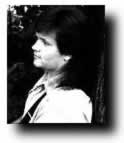 JP:
At the moment, I'm working on my next CD project, which will feature my "smaller" pieces- mostly guitar solos using "real"
guitar sounds. I have somewhat of a reputation as someone who "pushes
the limits" of what the guitar can do- really mutating things until
they are unrecognizable as guitar. And I really enjoy doing this. However,
"pushing the limits" ALSO means stepping outside of your "comfort
zone". A lot of musicians, especially lately, are plugging in their
instrument, throwing effects at the sound, washing it out, and then recording
their first takes and releasing them. That's fine, but that can also be
terribly limiting. There's a beauty in a finely crafted piece of music
that is almost undeniable- just listen to Tim Story's music. I would rather
hear one of his well-crafted pieces ANY day of the week than hear some
meandering deep-space improv, which passes itself off as "important"
because it has "deep sounds". JP:
At the moment, I'm working on my next CD project, which will feature my "smaller" pieces- mostly guitar solos using "real"
guitar sounds. I have somewhat of a reputation as someone who "pushes
the limits" of what the guitar can do- really mutating things until
they are unrecognizable as guitar. And I really enjoy doing this. However,
"pushing the limits" ALSO means stepping outside of your "comfort
zone". A lot of musicians, especially lately, are plugging in their
instrument, throwing effects at the sound, washing it out, and then recording
their first takes and releasing them. That's fine, but that can also be
terribly limiting. There's a beauty in a finely crafted piece of music
that is almost undeniable- just listen to Tim Story's music. I would rather
hear one of his well-crafted pieces ANY day of the week than hear some
meandering deep-space improv, which passes itself off as "important"
because it has "deep sounds".
MB: What, if any, are you aspirations outside of music, and are you pursuing
them?
JP: My aspirations are simple- to be a great husband and a great dad.
Achieving those aspirations? It takes a lifetime- if not longer..... :)
I'm fortunate in that I can be a "stay-at-home" dad for my daughter,
who is four. I truly love, and am amazed at, how all aspects of this strange
and wonderful life have integrated into this beautiful, sometimes chaotic,
whole. I have had other musicians subtly, and sometimes not-so-subtly,
imply that "family" is a hindrance to art. That's like saying
that "life" is a hindrance to art- it's completely NOT true.
Yes, family obligations might keep me from being able to spend a few dollars
for music gear. But music is about more than gear. And now- now that I
have learned how to "juggle" all the balls in this sweet life
of mine. My wife and I are expecting again! Just when I thought I'd never
have to change another diaper......... :)
MB: What are some of your long-term artistic goals?
JP: My long term goals are pretty simple- I just want to continue composing
music that comes straight from inside of my soul. And I will ALWAYS compose
music, because I truly enjoy doing so. Whether this music is ever released
to the public is a completely different thing.
MB: What piece/ pieces of music, upon hearing, made you sure that you
wanted to compose or create?
JP: Many pieces: La Mer by Debussy, Aerial Boundaries by Michael Hedges,
every track on "Kind of Blue" by Miles Davis- and many more
that I'm probably forgetting at the moment. To this day, the music of
Hildegaard von Bingen reminds me of how far I have to go musically on
this path.
MB: What advice do you have for artist/ musicians just starting out?
JP: The advice would be the same for any profession or "calling":
Be gracious. Be a good person. If you want some examples of this in my
particular field of music, look at Robert Rich, Mark Dwane, Mike Griffin
or Patrick O'Hearn. I know I'm leaving out others, but those four come
immediately to mind.
For the new artist specifically, I would encourage them to remember just
what they are doing, and why they are doing it. ALWAYS remember that you
are doing what you are doing because you love playing music. If you are
a musician because you want fame or fortune or validation or respect-
then you might be happier doing something else. The music should always
be "respected" for what it is, and never seen as a vehicle to
something else. Guard and protect your enthusiasm for your art.
Always see "the big picture"- at least to the best of your ability.
Bringing your "art" to life will not always be easy, but it
will be "worth it" in a personal sense, as long as you don't
become distracted by things which masquerade as "real" accomplishment.
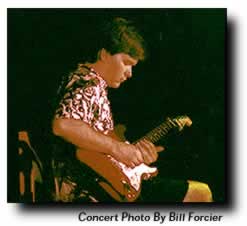 For
example, my CD, "To the Shores of Heaven" did quite well in
terms of "critical success", whatever that may be; it was picked
by the listeners of Echoes" as the top CD of 2000. It was chosen
by New Age Voice as the best ambient / space / electronic CD of 2000,
and it was reviewed in Billboard and other magazines. And you know what?
All those things didn't make the process of making music any "better"
for me. That whole creative moment is something that the "outside"
world can't touch. If anything can make that moment feel better or worse
for you, then it might be good to ask yourself some frank questions to
see if you are really creating from a "pure" place, or if you're
merely trying to "make a name" for yourself, and are using the
"I'm a artist" thing as a cloak to cover your REAL desires. For
example, my CD, "To the Shores of Heaven" did quite well in
terms of "critical success", whatever that may be; it was picked
by the listeners of Echoes" as the top CD of 2000. It was chosen
by New Age Voice as the best ambient / space / electronic CD of 2000,
and it was reviewed in Billboard and other magazines. And you know what?
All those things didn't make the process of making music any "better"
for me. That whole creative moment is something that the "outside"
world can't touch. If anything can make that moment feel better or worse
for you, then it might be good to ask yourself some frank questions to
see if you are really creating from a "pure" place, or if you're
merely trying to "make a name" for yourself, and are using the
"I'm a artist" thing as a cloak to cover your REAL desires.
Having said all that, also keep in mind that you have an audience. And
this audience, quite frankly, is 100% responsible for you achieving whatever
material success you might experience, so it's not a bad idea to be extremely
grateful for this. The artistic process can be one of great discovery
and great explorations, but not all those explorations are necessarily
good music. So be objective about your music, respect your audience, and
make sure that the audience gets only the "good stuff" from
you.
And, finally, don't be a bully. For example, when you receive a bad review
or "negative feedback" about you music, just ACCEPT that everyone
has their own personal taste in music, and not everyone is going to love
your music. Don't become one of those artists who rails on those who give
negative reviews, or creates around yourself an environment where people
feel they can't be honest with you about your music. Yes, you might eventually
make a "name" for yourself, you might become all-powerful in
your genre of music, and you might receive only positive reviews, but
you will have achieved this solely on your skills as an intimidator, not
a musician.
MB: What are your ten favorite recordings?
JP: In no particular order:
The Pearl by Budd/Eno
Music for Airports by Eno
Pet Sounds by The Beach Boys
Kind of Blue by Miles Davis
In a Silent Way by Miles Davis
The Joshua Tree by U2
The Way Home by Kevin Braheny
Arbos by Arvo Part
Officium by Jan Garbarek/Hilliard Ensemble
Lux Aeterna by Lauridsen
MB: What's in your CD Player now?
JP: I have a five CD changer, which currently contains:
AC/DC- Back in Black
Maiden, Mother, Muse: the women in the cantigas of Alfonso X by New Orleans
Musica Da Camera
Seal- Seal
Radiohead- Kid A
Salve Regina- the Benedictine Monks of Saint-Maurice & Saint-Maur,
Clervaux
MB: What does the production/ recording process involve for you?
JP: A LOT of wires and grief..... :) Being a guitar player, I have my
studio set up in order to help me achieve the goal of getting things recorded
quickly and painlessly. However, approaching the guitar as I do, I am
always changing the order of effects units I use, using some but not others,
etc... so, in reality, things can get pretty messy, to the point where
I've been told that what I do has a lot in common with the "good
old days" of modular synths, with all the patching and repatching
that I'm constantly doing.
MB: What is your creative formula?
JP: It's pretty simple- I create when I feel "moved" to do so.
Personally, I've discovered that it's terribly detrimental to the music
to sort of "force" the creative moment. I try to have the attitude
that, hey, I'm probably going to have a nice long life span, so there's
no real reason to get all frantic and release tons of music in short periods
of time. At least I hope I have a long life span..... :)
MB: What does your creative formula involve?
JP: Again, I kind of feel like I'm "at the mercy" of my creative
"muse". I know that this isn't a popular thing to say in this
age of "I'm the alpha-male, I'm gonna make it happen!", but
that's how things have always seemed to go for me. However, I CAN say
that there's a certain amount of "peace and quiet" involved
in my creative process- it's almost like the creative process starts flowing
when focus is taken off the "external" matters of this world.
MB: What kinds of equipment and/ or instruments do you use for recording
and/ or performance?
JP: This is the set-up I am using now: A Fender Stratocaster, an e-bow,
a Roland GP-100 pre-amp, Alesis Quadraverbs- I and II, Roland VM3100 pro
digital Mixer, and a PC with Sound Forge and Vegas recording software.
MB: What musical genres or traditions are you interested in learning about
and/ or experimenting with compositionally?
JP: I've always been happy that I enjoy so many different kinds of music.
Lately, I've been drawn to things that are very rhythmic in nature, which
is almost the exact opposite of what I do musically. It doesn't matter
what the genre is- metal, jazz, reggae, industrial- I've found myself
hearing those rhythms. It will probably be a while before any of that
shows up in my music, though; I enjoy listening to those rhythms more
than playing them.
MB: If you could start again, would you do anything differently?
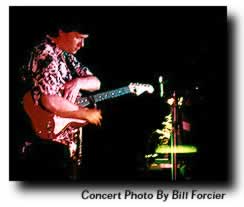 JP:
I would point out to myself that the music business, no matter what the
genre, is still the "music business". There are way more politics
involved in the "business end" of this genre than I originally
thought. It's sadly amusing to me that there are musicians and label people
giving themselves ulcers as they attempt to create music that will envelope
the listener in a sense of calm! It's ironic to me that there are musicians
and label people engaging in "cutthroat" behavior in their dealings
with others, all in the name of releasing "enlightened" music.
I've seen musicians so disheartened with the whole business side of music
that they completely quit what they are doing. It's sad, and yet, it's
understandable. JP:
I would point out to myself that the music business, no matter what the
genre, is still the "music business". There are way more politics
involved in the "business end" of this genre than I originally
thought. It's sadly amusing to me that there are musicians and label people
giving themselves ulcers as they attempt to create music that will envelope
the listener in a sense of calm! It's ironic to me that there are musicians
and label people engaging in "cutthroat" behavior in their dealings
with others, all in the name of releasing "enlightened" music.
I've seen musicians so disheartened with the whole business side of music
that they completely quit what they are doing. It's sad, and yet, it's
understandable.
MB: Do you perform?
JP: I perform VERY rarely- probably because of the whole "extreme
stagefright" thing.... :)
MB: Please describe, in detail, your most memorable performance or recording
experience.
JP: The first time I played at a Gathering in Philadelphia was my most
memorable live event. I was playing the song "Rain as a Metaphor"
from "To the Shores of Heaven", and I got to the middle section,
which has some pretty tricky guitar generated rain and thunder sounds.
I played my part, and there was this HUGE thunder-clap sound. I thought
to myself, just for a moment, "gosh, that sounds WAY better than
I thought it would!". Then I realized that an ACTUAL thunderclap
had taken place- because there was a lightning strike not far from the
venue! After the show, I remembered thinking "that was really cool!".
But then I remembered that I was ALSO sitting on-stage, surrounded by
a lot of electrical gear when that lightning strike happened, and that's
probably not the BEST place to be during a lightning strike..... :)
For more information:
Jeff Pearce Official Website: http://www.hypnos.com/pearce
Contact Jeff Pearce at: pearce@tctc.com
Hypnos Records Official Website : http://www.hypnos.com
The Gatherings website: http://www.thegatherings.org
|
![]()
![]()